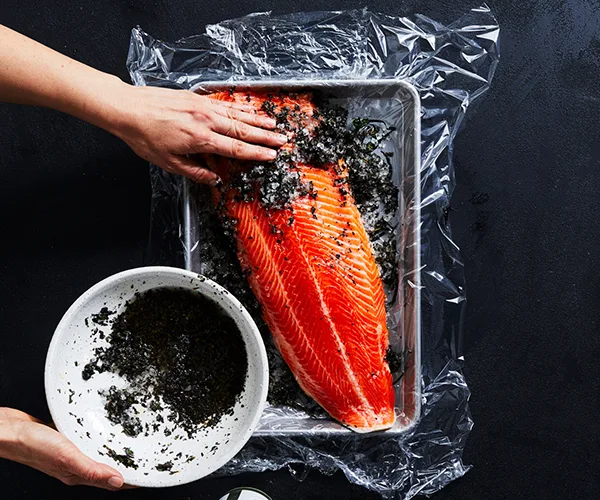Curing is one of the oldest methods of preservation, and it still finds favour as a way to not only extend the life of fish, but change its flavour and texture dramatically.
“A cured side of fish is a total show-stopper that requires very little work,” says Rob Cockerill, head chef at Sydney’s Bennelong. “It’s great to have in the fridge, especially over the entertaining season. At Bennelong, we serve it simply with a little cultured cream, pickled onion or citrus to help lift the flavour.”
Bread or blini, pickled fennel and herbs are always welcome accompaniments, too. But the start is where the real magic happens, with any flavours added to the salt-sugar mix working their way deep into the fish.
This basic method works well for a variety of fish – those with a high oil content, such as salmon, kingfish, sardines and mackerel, can all stand up to the process. The important thing is to adjust the recipe depending on the size of the fish: for smaller fish, reduce the quantity of salt, as well as the curing time. Cured fish will keep, covered, in the refrigerator for two weeks.
Ingredients
300 gm rock salt
50 gm white sugar
2 bunches shiso leaves, finely chopped
Zest of two mandarins
2 nori sheets, shredded
100 ml sake
50 ml rice wine vinegar
Side of ocean trout, about 1 kg, skin on, trimmed and pin-boned
Step 1
Combine rock salt and white sugar in a bowl. Add shiso leaves, mandarin zest and shredded nori sheets. In a separate bowl, combine sake and rice wine vinegar, then add to salt mixture. Mix with your hands until cure mix is the consistency of wet sand.

Step 1.
(Photo: Alicia Taylor)Step 2
Lay two sheets of plastic wrap, large enough to wrap trout, in a deep tray (a lot of liquid will come out of the trout as it cures). and spread half the salt mixture over the plastic.
Step 3
Place ocean trout skin-side down on top of the salt mixture in the tray, then cover with remaining salt mixture. The trout should be completely covered with the salt mixture. Wrap trout tightly, leave at room temperature for an hour, then refrigerate, turning after a day, for two days to cure.
Step 4
Unwrap trout and wipe the salt mixture off with a clean, damp tea towel. Pat dry with paper towels.

Step 4.
(Photo: Alicia Taylor)Step 5
Place trout skin-side down on a chopping board, and, starting at the tail end, cut into the fillet with a sharp knife, then tilt the knife and run it along and against the skin to separate it from the flesh. (Alternatively, leave the skin on, it’ll help the trout keep for longer.)

Step 5.
(Photo: Alicia Taylor)Step 6
Slice the cured trout thinly on an angle to serve.

Step 6.
(Photo: Alicia Taylor)Variations on the cure mix
A cure is typically based on salt and sugar, but from there the range of additions widens. “Of course, there’s the classic dill, gin and lemon combination,” says Cockerill. “But I’d encourage you to experiment.” He suggests a mixture of aniseed, cumin seeds, caraway, cloves and cardamom – don’t hold back, either, oily fish can take a lot of flavour.
Alternatively, try a mix of fennel and coriander seeds with lemon, or go for vivid red flesh and a more earthy flavour with beetroot and vodka.
 Alicia Taylor
Alicia Taylor

